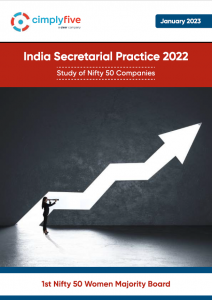
The full report can be downloaded from here: India Secretarial Practice 2022
The report, CimplyFive’s India Secretarial Practices, 2022 is based on the Annual Reports of Nifty 50 companies published in 2022. The report carries an in-depth analysis of the ten facets of corporate governance namely, Board composition, Frequency of Board Meetings, Sub-committees of the board, Non-executive directors’ compensation, Statutory auditors and audit fees, Secretarial Auditors, Company Secretaries, CSR spends, contours of Annual General Meetings and the competency skill matrix of the Board of the NIFTY 50 Index of the National Stock Exchange. The top three key findings of the reports are:
•The average number of Women Directors went up to 2.2 (AR 2020: 1.86), with 38 companies having more than 1 Women Directors
•Compared to the statutory requirement to hold one Independent Director (ID) Meeting in a Financial Year, the average number of ID Meetings held in the year was 1.73.
•48 of the 50 companies, which includes all the five PSUs and SBI held their AGM virtually
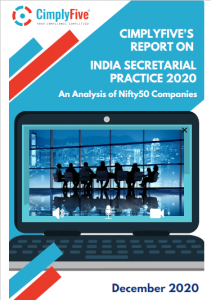
The full report can be downloaded from here: India Secretarial Practice 2020
The report, CimplyFive’s India Secretarial Practices, 2020 carries an in-depth analysis of the nine facets of corporate governance namely, Board composition, Frequency of Board Meetings, Sub-committees of the board, Non-executive directors’ compensation, Statutory auditors and audit fees, Secretarial Auditors, Company Secretaries, CSR spends and contours of Annual General Meetings of the NIFTY 50 Index of the National Stock Exchange. The top three key findings of the reports are:
• Reduction in the Board size: The average number of directors in the Nifty 50 companies reduced from 12 to 11. This reduction was across the board with 26 companes having a smaller board,with only 6 companies having a larger board in 2019-20. This could reflect better governance with individuals who were unable to devote time and energy dropping out of the boards.
• Increase in Statutory Audit fees: The average audit fees paid by the Nifty 50 companies increased by 17% over the fees paid in the previous year. Further the increase was seen in 31 companies. This increase could reflect higher diligence by the audit firms and the audit firms pricing in the regulatory risks.
• Higher compliance level on the CSR front: Total CSR spends by the Nifty 50 companies was at 108% of the mandated amount, reflecting a increase over the last six years of the mandate. The number of companies spending in excess of the mandate also increased from 39 in 2018-19 to 47 in the year 2019-20. These trends validate the Comply or Explain principle used to mandate CSR spends. The ‘Comply or Explain’ principle should be used for other corporate governance measures for the first five years before they are mandated to ensure greater compliance by the companies.
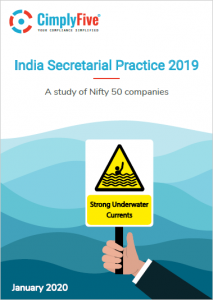
The full report can be downloaded from here: India Secretarial Practice 2019
The report, India Secretarial Practice 2019 carries an in-depth analysis in nine areas of the secretarial
practices of the companies constituting the NIFTY 50® Index of the National Stock Exchange based on
the data reported by them in their Annual Reports. The top three key findings of the reports are:
- Strong Currents in Still Waters: 80% increase in Audit Committee meetings over the previous year,
despite the average number of board meetings remaining the same at eight meetings. - Value driving Costs: Statutory Audit fees, Sitting fees to Non-executive Directors and
Compensation paid to Company Secretaries show significant increase reflecting the challenging
environment. - Comply or Explain method works: Given time, ‘Comply or explain’ rule works as seen in CSR
mandate where for the first time CSR spends were at 104% of the mandated spends in 2018-19.
Could this method be used for introducing ‘unpopular’ governance systems like delinking the filial
connection between the Chairperson and the Managing Director?

The full report can be downloaded from here: India Secretarial Practice 2018
The report, INDIA SECRETARIAL PRACTICES 2018 provides critical data points for introspection and debate on many factors influencing good governance like Audit Firms Concentration, Board Composition, Non-Executive Directors Compensation and Company Secretaries Compensation. This report highlights the issues and provides focus for an illuminating debate.
Some of the more significant findings in the report include:
- Board Size and Meetings: The average number of Directors in the Board was 12 (range of 5 to 22) and they held an average of 8 (range of 4 to 22) Board meetings in the year.
- Sub-committees: Nifty 50 companies had an average of 8 (range of 4 to 15) sub-committees.
- Non-executive directors’ compensation: The average sitting fees and profit based commission paid to all the non-executive directors was Rs.60 lakhs (range of Rs.11 lakhs to Rs.195 lakhs) and Rs.505 lakhs (range of Rs.31.5 lakhs to Rs.2125 lakhs) respectively.
- Statutory Auditors: Big 4 Audit firms audited 40 (80%) of the Nifty 50 companies. The average audit fees paid by the Nifty 50 companies was Rs.259 lakhs (range of Rs.8 lakhs to Rs.10 crores).
- Secretarial Auditors: The top 5 Secretarial Audit firms audited 23 (46%) of the Nifty 50 companies.
- CS Compensation: The average compensation paid to Company Secretaries, who are the designated compliance officers was Rs.116 lakhs (range of Rs.26 lakhs to Rs.601 lakhs).
- The mandated amount of CSR to be spent by all the Nifty 50 companies was Rs.6434 crores. Rs.6300 crores was the actual spends, which is 98% of the mandated amount.

The full report can be downloaded from here: India Secretarial Practices 2016
The report, INDIA SECRETARIAL PRACTICES 2016 carries an in-depth analysis of the Secretarial Practices of companies that form part of the NIFTY 50® Index of the National Stock Exchange by studying their annual reports published in 2016. The analysis is focused on six distinct areas, namely: Board Composition and Sub-committees of the Board, Directors’ Report, Secretarial Audit, Profile of the Company Secretary, Corporate Social Responsibility spends and the AGM notice.
Some of the more significant findings in the report include:
- Nifty 50 companies spent Rs. 5082 crores on CSR, which is 92.7% of the mandated amount of Rs.5478 crores; This represents an increase of 27% over 2015 spends and with reference to mandated amount an increase of 13.7% from 79% in 2015.
- 25 of the 48 Nifty 50 companies did not spend their mandated CSR amount in 2016, an improvement from 32 companies in 2015.
- Company Secretaries of the Nifty 50 companies earned an average annual compensation of Rs.97 lakhs in 2016, a decline of 12% from 2015.
- The number of women Company Secretaries in the Nifty 50 companies doubled from 3 to 6.
- 25 Nifty 50 companies were audited by the top 6 Company Secretary Firms; the top firm audited 6 companies.
- 10 Nifty 50 companies had qualified Secretarial Audit Reports; of which 7 were public sector companies.
- Nifty companies identified 153 unique Acts, Rules, Regulations, Guidelines and Standards to which they were subject to in their Secretarial Audit Reports.

The full report can be downloaded from here: Report of Companies Law Committe
The report, INDIA SECRETARIAL PRACTICES 2015 carries an in-depth analysis of the Secretarial Practices of companies that form part of the NIFTY 50® Index of the National Stock Exchange by studying their annual reports published in 2015. The analysis is focused on six distinct areas, namely: Board Composition and Sub-committees of the Board, Directors’ Report, Secretarial Audit, profile of the Company Secretary, Corporate Social Responsibility spends and the AGM notice.
Some of the more significant findings in the report include:
- Nifty companies spent Rs.3989 crore on CSR, which is 79% of the prescribed amount of Rs.5046 crore; 32 Nifty companies (64%) did not spend their prescribed amount.
- Company Secretary of the Nifty companies’ earned an average annual compensation of Rs.110 lakhs.
- 44% of the Nifty companies were audited by the top 5 Company Secretary Firms; 52% of Nifty companies by the top 7 Company Secretary Firms.
- Nifty companies identified being subject to 157 unique Acts, Rules, Regulations, Guidelines and Standards in their Secretarial Audit Reports.
- 13 (28%) of the 47 Nifty companies which disclosed Secretarial Audit Reports had qualified Reports; of which 7 were public sector companies.

Read the full report here: ‘Report on Board Evaluation Practices,2023‘
CimplyFive’s 2023 Board Evaluation Report, the fifth edition in this series, evaluates the quality of Board Evaluation disclosures using our proprietary Five-Star Rating System. Introduced in 2016, this system assigns a star for each key parameter disclosed: the Evaluation Process, Criteria Considered, Favourable Outcomes, Improvement Areas Identified, and Action Plan to address these areas.The findings of this year’s study underscore how Indian companies are continually evolving their Corporate Board Evaluation practices to align with global standards of governance.
Key Findings:
- 45 private-sector entities disclosed their Corporate Board Evaluation practices, while 5 public-sector companies were exempt. 10 companies achieved a Five-Star rating, showcasing exemplary, globally comparable disclosures.
- Companies disclosed a total of 153 parameters across the 5 parameters.
- 14 companies (31%) utilized external consultants for board evaluations, an increase from 11 in 2022, and 8 companies (18%) employed digital online survey tools to ensure anonymity and encourage constructive feedback.
- The average disclosure length was 337 words, with companies rated Five-Star averaging 574 words, in contrast to 243 words for Two-Star companies.
Through this report, CimplyFive continues its mission to leverage research and technology to promote better governance and disclosures. The findings reveal a steady improvement in the quality and depth of board evaluation disclosures, underscoring the growing commitment of Indian companies to governance excellence. We look forward to your feedback to enrich this study at contact@cimplyfive.com.

Read the full report here: ‘Report on Board Evaluation Practices,2022‘
CimplyFive’s report on Corporate Board Evaluation Practices, 2022, the fourth in this series of report, uses CimplyFive’s proprietary model of Five-Star rating introduced in their first report on Board Evaluation in 2016 for evaluating quality of Board Evaluation disclosures. One star is assigned for each of the parameter disclosed -the Evaluation process, Criteria considered, Favourable outcomes, Improvement areas identified and Action plan for addressing the improvement areas. Based on the disclosures made by Nifty50 companies in 2022, our study highlights were:
- 10 (9 in 2021) companies were rated at Five-Star, 5 (3 in 2021) at Four-Star, 16 (14 in 2021) at Three-Star, 14 (16 in 2021) at Two-Star and 0 (2 in 2021) at One-Star. Five (6 in 2021) companies in the Nifty50 index were exempt from making these disclosures as they are public sector companies.
- Compared to 2021 disclosures, 10 companies showed improved levels of disclosures, 34 the same level of disclosures and in 1 company there was reduced disclosure in 2022.
- 10% growth in the parameters disclosed from 133 in 2021 to 146 in 2022. The largest increase was seen in Favourable Outcome reported -6 companies, 4 companies for parameters used, 3 companies for process followed.
- The report also highlights the exemplary disclosure practices by Indian Companies on different elements of board evaluation.

Read the full report here: ‘Report on Board Evaluation Practices,2021’
CimplyFive’s report on Corporate Board Evaluation Practices, 2021 uses CimplyFive’s proprietary model of Five–Star rating introduced in their first report on Board Evaluation in 2016 for evaluating quality of Board Evaluation disclosures. A star is assigned for each of the parameter disclosed –the Evaluation process, Criteria considered, Favourable outcomes, Improvement areas identified and Action plan for addressing the improvement areas. Based on the disclosures made by Nifty50 companies in 2021, our study hightlights were:
• 9 (1 in 2020) companies were rated at Five–Star, 3 (9 in 2020) at Four–Star, 14 (11 in 2020) at Three–Star, 16 (13 in 2020) at Two–Star and 2 (6 in 2020) at One–Star. Six (7 in 2020) other companies in the Nifty50 index were exempt from making these disclosures as they are public sector companies.
• Compared to 2020 disclosures, 25 companies showed improved levels of disclosures, 14 the same level of disclosures and in 5 companies there was reduced disclosure in 2021.
• 25% growth in the parameters disclosed from 106 in 2021 to 133 in 2022. The largest increase was seen in Action Plan reported –10 companies, 6 companies for process followed, 4 companies each for criteria considered and reporting favourable outcomes, and 3 companies for reporting Improvement areas identified.
• The report also highlights the exemplary disclosure practices on different elements of
board evaluation.
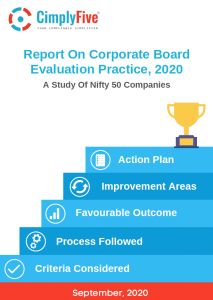
Read the full report here: CimplyFive’s report on ‘Corporate Board Evaluation Practice, 2020’
Corporate Board Evaluation Practice, 2020, carries an in-depth analysis of the five parameters that constitute a comprehensive board evaluation practice of the companies constituting the NIFTY 50® Index of the National Stock Exchange based on the data reported by them in their 2020 Annual Reports.
The top three key findings of the report are:
- Significant progress made in Corporate Board Evaluation in the last 5 years: Number of parameters reported by the Nifty50 companies increased by 45% from 73 to 106 parameters. For the first time we have a company that has disclosed all the five parameters -criteria used, process followed, favourable outcome, improvement areas and action plan for implementing improvement areas.
- Enhanced focus on end-objective of Corporate Board Evaluation: The primary intent of Corporate Board Evaluation is to identify improvement areas and define an action plan to redress it. Eleven companies or 27.5% of the companies that reported have identified and reported improvement areas and six companies, constituting 15% of the population had reported an action plan for implementing it.
- Increased use of External Consultant and Digital tools for Board Evaluation: Eleven companies had engaged an external consultant and six companies had used a digital tool in their Corporate Board Evaluation, reflecting the importance attached to this practice.
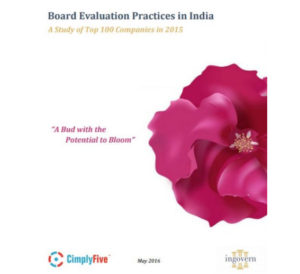
The full report can be downloaded from here: Board Evaluation Practices in India
Board Evaluation Practices in India: A Study of Top 100 Companies in 2015
Captures an in-depth analysis of the Board Evaluation practice in India contrasted with global best practices to identify areas for improvement. We have developed a proprietary 5-Star Rating System for Board Evaluation and applied it to the top 100 companies India
Highlights of the Top 100 Companies evaluation using our proprietary 5-star rating system are:
- Companies got 3-Star rating, the highest rating given to the select group of companies. These companies disclosed positive results of their evaluation in addition to the evaluation criteria and evaluation process.
- 52 companies got 2-Star rating, as they reported both the evaluation criteria and the evaluation process
- 26 companies got 1-Star rating, as they reported either the evaluation criteria or the evaluation process
- 3 companies did not do Board Evaluation despite the mandate
- 17 companies were exempt from Board Evaluation being public sector companies. Despite exemption, 3 of them shared their evaluation process, criteria or outcome.
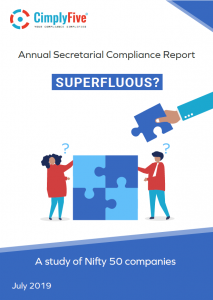
The full report can be downloaded from here:Annual Secretarial Compliance Report
The report, Annual Secretarial Compliance carries an in-depth analysis of the reports filed by the companies constituting NIFTY 50® Index of the National Stock Exchange by analysing their content. The key findings of the reports are:
- 22%, 11 of the Nifty 50 companies reported non-compliances during the year 2018-19. Of the eleven, seven were public sector companies.
- A total of 26 deviations were reported by these 11 companies. The maximum noncompliances were 7 for public sector companies reported by SBI and 3 for private sector companies reported by Larsen & Turbo.
- Based on their nature, the 26 non-compliances fall under 14 different categories. Inadequate representation on the board of independent directors tops the list with 6 companies, closely followed by 5 companies that did not conduct an evaluation for their independent directors.
- Stock exchanges had taken penal action against five companies for six non-compliances, out of the eleven companies reporting 26 non-compliances reported.
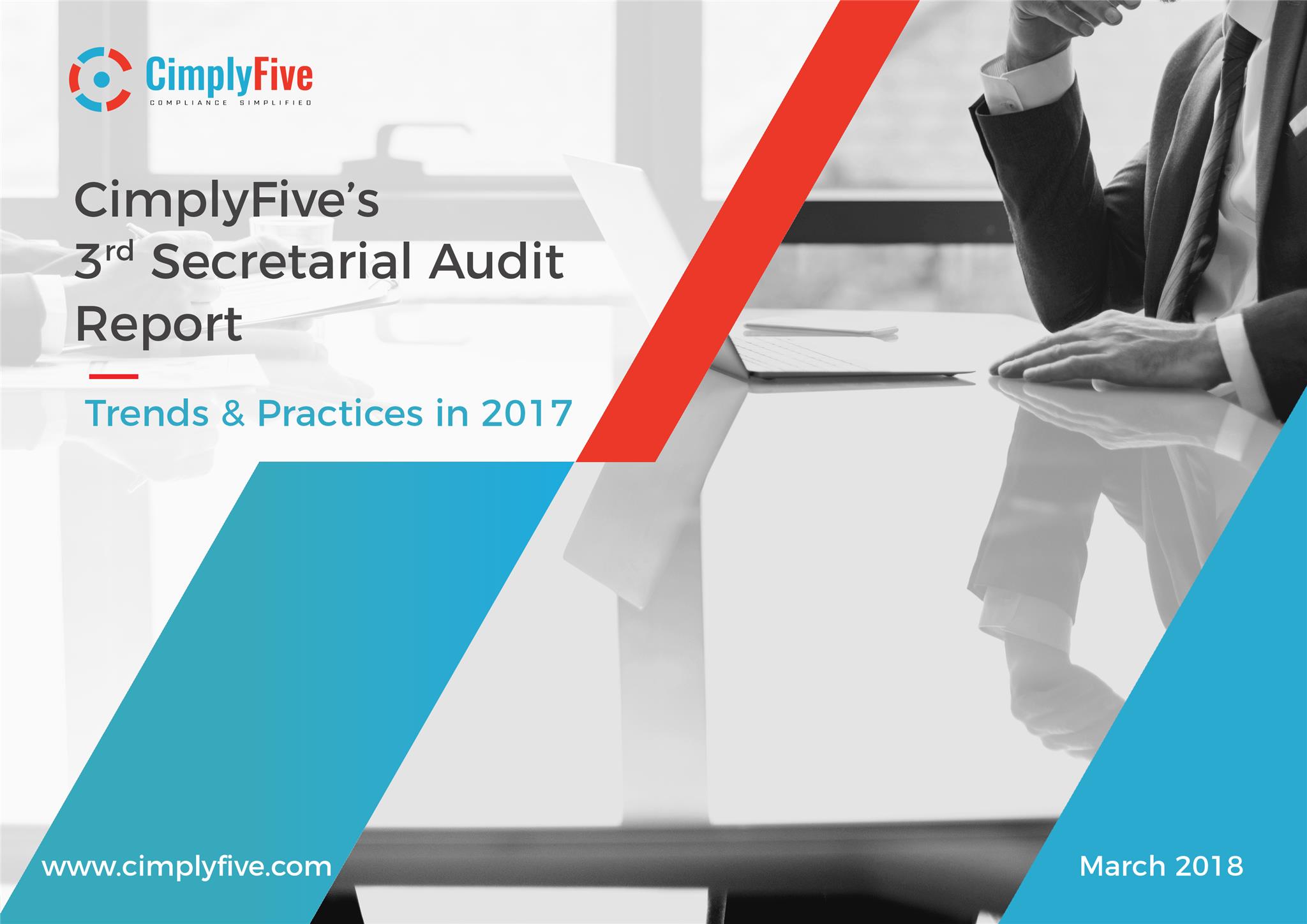
The full report can be downloaded from here: Cimplyfive’s 3rd Secretarial Audit Report-Trends & Practices in 2017
2017 was the third year Indian companies have published Secretarial Audits Reports (SARs) after its introduction. We, at CimplyFive, are happy to share with you the findings of our Third Secretarial Audit Reports: Trends & Practices 2017. In contrast to the first year where there was no precedence for companies to follow, in the next two years companies had access not only to their peer-group reports but also to our report that compiled the different, distinct and diverse practices in the Secretarial Audit Reports for the years 2015 and 2016.
Like in the earlier two years, we have considered S&P BSE 500 Companies as the sample for this study. The geographical and sectoral diversity contained in S&P BSE 500 companies provides a reasonably representative indicator of the Indian Corporate Sector.

The full report can be downloaded from here: India Secretarial Practices 2016
SECRETARIAL AUDIT REPORTS: TRENDS & PRACTICES in 2016 carries an in-depth analysis of the Secretarial Audit Reports of companies that form part of S&P BSE 500 companies. The findings are reported under three major heads: findings on Secretarial Audit Reports, compensation of Company Secretaries and concentration of audits among Secretarial Auditors.
Some of the key findings in the report are:
- 480 of the S&P BSE 500 companies underwent a Secretarial Audit in 2016. Of this, 81% had an unqualified or ‘clean’ report, up from 72% in 2015. In absolute numbers the companies with unqualified report increased from 335 to 387.
- For the second year running, Mindtree Limited took the top spot for listing 230 mandates that they comply with. BASF India Limited with 92 and Geometric Limited at 91 ranked 2nd and 3rd.
- The average annual compensation for Company Secretaries in our sample was Rs.56.68 lakhs, an increase of 14% over the earlier year of Rs.49.61 lakhs. The highest compensation was of Rs.902.32 lakhs and the lowest was at Rs.3.00 lakhs.
- Gender-wise, Company Secretaries profession is well represented with women accounting for 43% of the total registered professionals. However among the S&P BSE 500 Companies, women CS accounted for only 16%, with their representation coming down sharply at 6% among the top 100 companies ranked by turnover and 4% among the top 25 companies.
- The average compensation for women CS was Rs.31.61 lakhs, which is 52% of the average compensation paid to men CS of Rs.61.34 lakhs. Factors contributing to this variance in compensation was the size of the company and multiple roles held by the CS.
- Top 6 Secretarial Auditors conducted 76 audits compared to 80 in 2015. The top ranked Auditor, Ms. Parikh & Associates Mumbai, conducted 19 audits.
- Mumbai/Thane was the most preferred location with 77 Secretarial Auditors located there, followed by New Delhi with 53 and Bangalore with 24.

The full report can be downloaded from here: India Secretarial Practices 2016
S&P BSE 500 Secretarial Audit Reports Analysis
Captures the different, distinct & diverse practices across the 500 companies to provide data for contemplation, reflection and learning. The report is divided into four distinct areas: the Auditee, the Auditor, the Report and the Mandates. A major highlight of this report is to draw lessons from the diverse practices and make concrete recommendations to the CS professionals and the Regulators
Some of the more significant findings in the report include:
- Company Secretaries of listed companies are now designated as the Chief Compliance Officer, in addition to being a Key Managerial Personnel. Given this responsibility and statute our analysis of the annual compensation paid to Company Secretaries show that in 59% of the companies, they earned less than Rs.50 lakhs. Further in 31% of the companies, the annual compensation was less than Rs.25 lakhs.
- Women Company Secretaries were found only in 61 (12%) companies.
- 272 Secretarial Auditors audited 463 companies. Mumbai/Thane accounted for 160 (35%) of the Secretarial Auditors, with New Delhi 90 (19%), Pune 36 (8%), Kolkata 32 (7%) and Bangalore 31 (7%) being the top five locations for Secretarial Auditors.
- Based on the number of audits undertaken, the top ranked Secretarial Auditor conducted 17 (4%) audits, while the top 5 auditors conducted 64 (14%) and the top 10 auditors conducted 100 (22%) audits.
- Women Secretarial Auditors conducted the audit only in 42 (9%) companies out of the 463 companies analysed.
- 460 mandates were listed in the 463 SARs reviewed. It comprised of 241 (51%) Acts, 89 (19%) Rules, 52 (11%) Regulations and 78 (17%) others consisting of Circulars, Codes, Conventions, Directions, Guidelines, Orders, Policy, Schemes and Standards
Here is the collection of 22 short articles that appeared in our newsletter, iComply under the series First of First- The Origin of Basic Concepts inCorporate Law, penned by Shankar Jaganathan, our Founder & Chief Executive.
Click here to download the compilation of First of First series.
A series of articles written by Shankar Jaganathan discussing the link between technology and the provisions of law. How can Company Secretaries leverage this understanding of technology to be more efficient and keep sensitive company data safe ?
Click here to download the compilation of Technology for the Company Secretaries series.

Read the full report here: ‘Clear’s Handbook on Related Party Transactions, 2023 ’
Related party transactions (“RPT”) refer to transactions that occur between two parties with pre-existing relationships, such as companies within the same corporate group, subsidiaries, joint ventures, or entities with common ownership, management, or control. Such transactions can involve the exchange of goods, services, loans, or transfer of assets. The nature of these transactions often raises questions about fairness, transparency, and potential conflicts of interest.
In today’s complex business environment, related party transactions have become a subject of increasing scrutiny by regulators, investors, and stakeholders. This handbook aims to provide a comprehensive analysis of related party transactions, focusing on the evolution of RPT along with the reporting requirements, the compliance calendar as per Companies Act, 2013, and SEBI’s LODR 2015 , and using the conclusions so drawn to recommend a model RPT Policy.
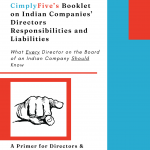
Read the full report here: ‘Booklet on Company Directors Responsibilities and Liabilities ’
Directors, especially Independent Directors (IDs) have been in limelight in the recent past. With every corporate misdeed and scandal, the focus on Directors and IDs has intensified, not just from the media, but also from the regulators. For the first time globally, in India, IDs are required to get themselves registered in a central database mandated for this purpose and obtain more than 60% marks in an online test conducted by a statutory authority within one year from March 1, 2020, when this law came into effect.
Given this onerous duty to qualify as an ID by clearing an examination, we have summarized in this primer their responsibilities and penalties under a few major central statutes in one place to provide both the prospective IDs, the existing IDs, and other Directors their potential liabilities.

Read the full report here: ‘Report on TOR for Sub-Committees of the Board ’
CimplyFive’s report on TOR for Sub-committees of the Board covers the four critical committees, namely, Audit Committee, Nominations & Remuneration Committee, Independent Directors Committee and Shareholders Grievance Redressal Committee. Our report by analysing the Charters of Nifty 50 companies presents:
• Coverage in the charters of Nifty 50 companies w.r.t. prevailing regulations
• Voluntary practices adopted by Nifty 50 companies in their charters and
• Model Charters based on our analysis of the prevailing regulations and study of Nifty50 Companies.

Read the full report here: ‘Independent Directors Induction & Familiarisation Program, 2021 ’
The CimplyFive report, Independent Directors Induction & Familiarisation Program, 2021 analyses the key practices contained in the Policy documents of the Nifty 50 companies covering:
- the mode of familiarisation with the company’s industry, business model, the roles, rights and responsibilities of Independent Directors.
- the methods used in the induction process.
- the disclosure of the programs conducted and the duration of the programs.
Compliance with the regulations appear more to be with the letter of law as reflected in:
- Only a handful companies disclosed in their policy document the date on which this policy was approved, identify the approving authority and have the date or event that triggers the next review.
- An uniform practice is outlined for induction of independent directors, both experienced and the new entrant in the policies, making it sub-optimal for effective implementation.
- Information on the programs conducted and the time spent by Independent Directors on induction and familiarisation programs is not designed to help decision making as cumulative data is required to be provided and not the data pertaining to active directors on the board.

Read the full report here: ‘Effectiveness of Virtual AGM in 2020’
Effectiveness of Virtual AGM in 2020 analyses the key data points reported by the Nifty 50 companies on AGM covering the schedule, duration, number of shareholders, change in shareholding between promoters, institutional holders and the public, attendance and voting across the three segments of shareholders.
The top three key findings of the reports are:
- Increase in public shareholders participation:
- The average shareholder attendance across Nifty 50 Companies in the AGM increased 6x, i.e. six time compared to 2019. Most of this increase was in Reliance Industries, where 307,582 shareholders participated in 2020 compared to 1190 in 2019. Excluding Reliance Industries, the attendance declined by 71% in 2020.
- Despite the decline in attendance, voting by public shareholders increased by 3.6% compared to 2019.
- Institutional shareholding increase:
- Institutional Shareholders increased their shareholding by 1.2% across Nifty 50 companies, at the cost of both promoters and public shareholders.
- Increase in shareholder:
- There was a 37% increase in the average number of shareholders across the Nifty 50 companies in 2020 compared to 2019 as on the cut-off date for e-voting.
Read the full report here: CimplyFive’s Report on the Companies’ Disclosures on the Impact of Covid-19 on their Businesses
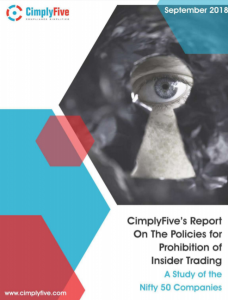
The full report can be downloaded from here: Cimplyfive’s Report on The Policies for Prohibition of Insider Trading
Only when there is fair play, markets are an effective instrument and sustainable means to promote trade. A critical element of fair play involves providing a level playing field to all buyers and sellers. If any one category of buyer or seller gains at the cost of the other, the market itself becomes unsustainable and fails. To revitalize markets, an external intervention is required in the form of regulations that is enforced. Prohibition of insider trading is a regulation introduced to revitalize stock markets and create a fair playing field. When enforced, it results in reduced cost of equity that spurs market activities. In fact, one multi-country research report that spans multi-decades has quantified reduction in cost of equity by about 5%, if the insider trading laws are strictly enforced.
We have analysed the Policy on Prohibition of Insider Trading and the Code of Fair Disclosure of UPSI (Unpublished Price Sensitive Information) as formulated and disclosed by the Nifty 50 companies in their website. The policy formulated by the companies not only reveal the thinking of the company in this matter, but it also provides valuable information on the systems, processes and administration of this policy. Based on our study, we have also drafted a model Code on Prohibition of Insider Trading for companies to consider and adopt, with or without modifications.
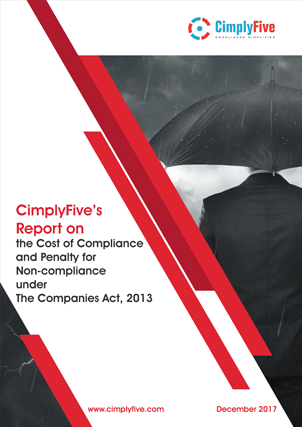
The full report can be downloaded from here: Cimplyfive’s Report on the Cost of Compliance
For the Indian corporate professional, Come September stands for much more than a famous romantic comedy film of the 1960s. The scale at which punitive action was taken against non-compliant Indian companies and their directors in September 2017 struck at the core of Indian corporate professionals, leaving them stunned. This research was in the planning stage for a long time, only for the events of September 2017 to trigger it by making this subject relevant to all India corporate professionals.
In any civilized society compliance with law is manda¬tory and non-negotiable. Despite this, in practice we see a strong co-relation between the penalties levied and the cost of compliance. Rational businesses invest in compliance cost to the extent it is justified by penalties they would be required to pay arising from remaining non-compliant. The penalties they use to evaluate is not the penal provisions enacted in law but what is seen in actual levy. Consequently the extent of compliance in any regulatory environment is directly related to the certainty of its enforcement reflected in the amount of penalties collected and number of convictions obtained for non-compliance.
The ratio of the Penalty paid for non-compliance to the Cost of compliance may be called the ‘Compliance Index’ Where the Penalty for non-compliance is equal to the Cost of compliance, the Compliance Index is 1, reflecting indifference to the state of compliance.

The full report can be downloaded from here: Cimplyfive’s Report On The Policy For Dealing With Related Party Transactions
A very critical and an interesting strand in the history of corporate law is the evolution of regulations pertaining to RPT, for mal-governance often manifests itself though RPTs. Despite its role in hampering good governance, RPTs are not banned anywhere in the world, as this ‘cure’ is more harmful than the ‘disease’ itself. For if RPTs were to be banned, the very existence of corporate entity as a form of business could be threatened.
Given the interdependence between RPT and corporate entity, a key element of corporate law and good governance practice is visible in regulation of RPTs. Hence any study of corporate law, good governance practices or corporate secretarial practice needs to frequently and in depth evaluate the current state of RPT regulation as practiced. Evaluation of statutes provide insights of limited value, therefore we have in addition to statutes focused on the practices in the real world of corporate board rooms for only corporate practices reflect the true state of corporate governance and the health of corporate entities.
“Cimplyfive’s Report On The Policy For Dealing With Related Party Transactions” looks at the ‘Policy on Dealing Related Party Transactions’ of the Nifty 50 Companies as the policy is the primary means through which the RPTs are administered by the company for identifying, monitoring, assessing and deciding the validity of RPTs. We have picked the Nifty 50 companies as they represent the elite of the corporate world. Based on this study we have attempted to create a model Policy on Dealing with Related Party Transactions for companies to consider and adopt, with or without modification

The full report can be downloaded from here: Report of Companies Law Committe
As per the Companies Act, 2013, Indian companies have started making director pay-ratio disclosures in annual reports. This report analyses the pay-ratio disclosures made by Nifty-50 companies and provides key-takeaways. The report also compares Indian pay-ratio disclosure regulations with those in the US.
Highlights of this report are:
- 34 Nifty-50 Companies disclosed Pay-ratios. Pay of 95 Directorships is analysed in this study
- 3 Companies – Bajaj Auto, Bosch and Maruti Suzuki shied away from making any such disclosures
- PSUs are exempted from Pay-Ratio Disclosures. Nifty-50 has 10 PSUs
- 11 Directors’ Remuneration exceeds 400 times the median employee pay of their companies. This includes 3 Directors each of Hero MotoCorp and Lupin
- 70% of the top-10 Highest Paid Directors of Nifty companies are Promoter individuals
- Mr. Kumar Mangalam Birla was the only Non-executive Director among the top-10 highest paid directors. He is Non-executive Chairman of 4 Nifty companies and was paid a total of Rs. 40.5 Crores in FY15 from these companies
- Rs. 9.00 Crore: Average remuneration of an Executive Director of Nifty Company
- Rs. 5.87 Lakh: Average Median Employee Remuneration
- 170 times: Average ratio of Pay of Executive Directors to the Median Employee Remuneration
- 8 Directors paid more than 1% of the standalone net profits with the highest being 2.33%
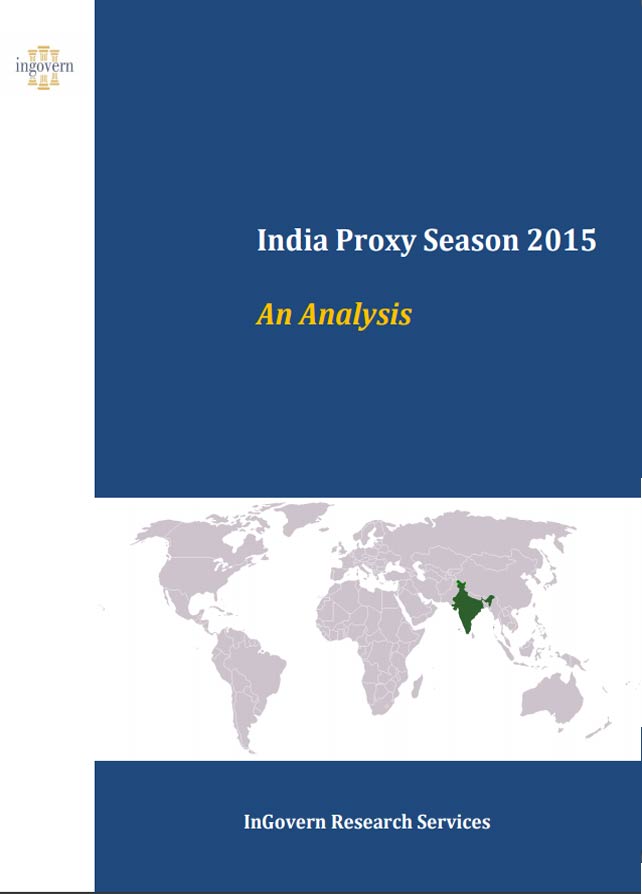
The full report can be downloaded from here: Report of Companies Law Committe
The India Proxy Season 2015 came to an end on September 30, 2015. InGovern collated meeting details of 1,228 companies listed on NSE and BSE. These meetings included Annual General Meetings (AGMs), Extraordinary General Meetings (EGMs), Court Convened Meetings (CCMs) and Postal Ballots (PBs) and were held during the period of January 1, 2015 to September 30, 2015.
Listed below are some of the statistics of the Proxy Season 2015:
- A total of 9,909 resolutions were proposed by these 1,228 companies
- This included 8,620 resolutions through AGMs, 231 resolutions through EGMs, 49 resolutions through CCMs and 1,009 resolutions through PBs
- 7,048 resolutions were classified as ordinary resolutions while 2,861 were special resolutions
- 8,333 resolutions were proposed by the management while 1,576 resolutions were proposed by shareholders
- Around 42% of the total resolutions proposed were of ordinary businesses
- Ordinary business includes resolutions for adoption of accounts, dividends, re-appointment of directors retiring by rotation and appointment of statutory auditors
- September was the busiest month with 4,774 resolutions being tabled at the meetings
- August (2,202 resolutions), July (1,383 resolutions) were the second and third most busiest months respectively
The report also contains sections on:
- Resolutions tabled by companies such as Siemens, JSW Holdings, Apollo Hospitals, Adani Ports, Yes Bank, United Spirits, etc., which faced investors’ scrutiny and were voted against by more than 20% of voting institutional shareholders
- Increasing activism by institutional investors
- Updates brought during the year by SEBI, Ministry of Corporate Affairs and others
